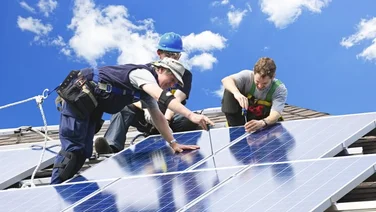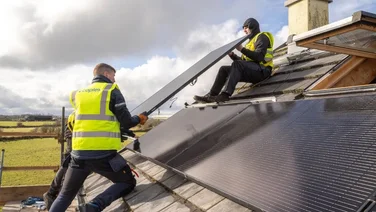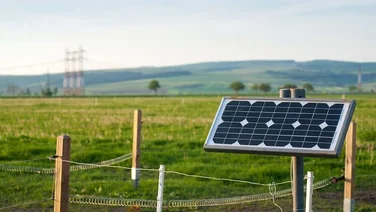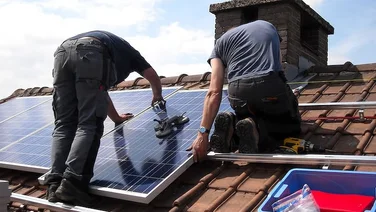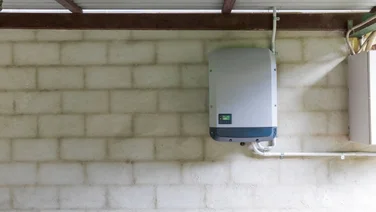- Solar panel costs in the UK typically range from £4,000 to £10,000, depending on your property size, energy usage, and system specifications.
- Long-term savings and government incentives can help offset upfront costs, with most homeowners breaking even in just over 15 years.
- This guide includes everything you need to know about installation pricing, financing options, maintenance, and choosing the right installer.

Prices vary for a typical solar panel installation in the UK. Still, they typically range from around £4,000 for a small 2.1 kilowatt-per-hour system for a 1-2 bedroom property to many thousands for larger systems.
While that might sound like a lot, remember that solar panels save you huge amounts of money and can earn you cash while helping reduce your carbon footprint. And they’ll still generate electricity on gloomy days, which the UK experiences a lot of.
There are government grants for solar panels and other financing options can help massively with the upfront cost, making installation more accessible than ever.
If you know about solar panel costs and are ready to install, fill out our form, and our trusted installers will contact you.
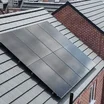
Get free solar panel quotes
Answer a few quick questions, and a trusted installer will send you a bespoke solar panel quote.
How much do solar panels cost?
According to industry averages, solar panels for the average three-bedroom house will cost £7,000. This is the average price of a 3.5 kilowatt-peak (kWp) system, which is typically the right fit for a standard three-bedroom house.
A household with one or two bedrooms generally needs a 2.1kWp system, which costs around £4,000 for six panels. The cost of solar panels depends on numerous factors, including the size of your roof, your electricity usage, whether you want to include the price of a solar battery, and the number of solar panels you need. Even the type of roofing, the height of your home, and where your electric cables are will affect the cost.
To find out how much installing solar panels could cost, fill in this quick, easy tool.
The cost of solar panels will be different for every household, but you can gain a better understanding by viewing the video below:

Get free solar panel quotes
Answer a few quick questions, and a trusted installer will send you a bespoke solar panel quote.
When will you break even on solar panels?
According to our calculations, the average household will need just over 15 years (15.66 to be precise) to break even.
Solar panels typically last at least another 10 years after this point. On average, a three-bedroom household will profit from energy bill savings and SEG revenues of £4,335.11. A one-to-two-bedroom home will benefit from £2,601.07, while a four-bedroom home will generate £6,069.16.
We base our calculations on the latest MCS data on solar panel costs and the yearly daylight hours in the UK. For all the nuts and bolts, please check out our full page, “Are solar panels worth it?“
In the meantime, use this table to determine the break-even point and savings you can make for each different panel system:
| System size | System cost | Annual savings | Break even point |
|---|---|---|---|
| 2.1 kWp | £4,216 | £272.67 | 15.46 years |
| 3.5 kWp | £7,026 | £454.45 | 15.46 years |
| 4.9 kWp | £9,837 | £636.23 | 15.46 years |
*Note that the figures above are illustrative only.
The right number of panels for your home
|
Property size
|
Annual electricity usage
|
Number of solar panels
|
Average installation cost*
|
Annual electricity bill savings**
|
Time it takes to break even
|
Solar panel profit after 25 years
|
|---|---|---|---|---|---|---|
|
1-2 bedroom house |
3 bedroom house |
4 bedroom house |
||||
|
1,800 kWh |
2,700 kWh |
4,100 kWh |
||||
|
6 |
10 |
14 |
||||
|
£4,216 |
£7,026 |
£9,837 |
||||
|
£272.67 |
£454.45 |
£636.23 |
||||
|
15.46 years |
15.46 years |
15.46 years |
||||
|
£3,026 |
£4,335.11 |
£6,069.16 |
* Please note: These prices are based on Microgeneration Certification Scheme (MCS) cost data (March 2024), the average price of electricity (April-June 2024), and Ofgem’s latest typical domestic consumption values (2024). Total costs may increase with more complex installations. The above estimates do not include the cost of a solar battery.
** Includes estimated Smart Export Guarantee payments
Factors that impact solar panel costs
Three key factors affect the price of solar panels:
- Panel type: Some solar panel types, such as monocrystalline solar panels, cost more than others. This is because they use the latest technology and are highly efficient.
- Panel efficiency: The more sunlight a solar panel can convert into electricity per square metre, the more expensive it will be.
- Panel number: More solar panels mean more materials, which means a higher cost. You can limit the number of panels you need by choosing highly efficient ones (although they may cost more).
If you want to know more about solar panel efficiency or find out how many solar panels you need, visit our guides.

Get free solar panel quotes
Answer a few quick questions, and a trusted installer will send you a bespoke solar panel quote.
What makes up the cost of solar panel installation?
The total cost of installing solar panels varies between suppliers, but generally breaks down into three main categories: materials, business overheads, and labour. Understanding these can help you spot fair quotes—and avoid inflated ones.
1. Materials (40–50%)
This includes the panels, brackets, inverter, cables, and other necessary equipment. For an average three-bedroom home, expect materials to cost around £3,150. Installers usually apply a 30% markup on base material prices to cover profit, which is standard across the industry. When comparing quotes, don’t hesitate to ask for a breakdown of material costs.
2. Business Costs (30–40%)
These are the operational costs your installer absorbs, including:
- Planning permissions and approvals
- Scaffolding setup
- Transport, fuel, and equipment
For a typical 3.5kWp system, this category adds about £2,450 to the total bill.
3. Labour (10–30%)
This covers the physical installation, wiring, and system setup. Labour costs vary based on system size and complexity—larger systems or tricky rooftops will cost more.
Solar panel installation usually takes one to two days, but larger installations – over 14 panels – can take up to four days.
Much of this time is spent constructing the scaffolding, so don’t be concerned if it’s been a few hours and there still aren’t panels on the roof.ustomers should be aware of installers pushing limited-time offers on solar panels. Instead, you should get quotes from at least five reputable installers and check their Trustpilot reviews before signing a contract.
How can I reduce solar panel costs?
The best way to reduce the cost is take advantage of government solar panel grants. Here are the main ones:
- ECO4 scheme: Funding for solar panels for energy-poor households on certain benefits
- Solar Together: A group-buying scheme that can save you 30-50% on the cost of solar panels
- The Home Energy Scotland Loan: An interest-free loan for solar panels available for most Scottish residents
- Warm Homes Local Grant: This grant provides funding for low-income households with EPC ratings between a G and D. It covers various energy efficiency measures, including solar water heaters, particularly for homes off the gas grid.
For more information on eligibility requirements and how to apply for these schemes, check out our guide to solar panel grants. You can get solar panels on finance from a variety of established companies, including:
- E.ON
- Scottish Power
- SolarStyle
- Sunsave
For E.ON solar panels, for example, prices for a typical six-panel (2.61kWp) solar system start at £5,785 and can be bought on finance.
Its interest-free option enables you to install this for £241.04 per month over 24 months.bles you to get this installed for £241.04 per month over 24 months.
Solar panel maintenance costs: what to expect
Solar panels require minimal upkeep, but you should budget for three key maintenance costs over time. First, the inverter, which converts solar energy into usable power, costs £500 to £1,000 and typically needs replacing every 10 years.
Second, while panels are durable, repairs may be needed due to damage from weather or wildlife, with costs ranging from £80 for minor fixes to £1,500 for major ones; preventative steps like bird-proofing can help.
Lastly, while UK rain helps keep panels clean, professional cleaning is recommended twice a year at around £100 per visit, especially after dry spells or heavy bird activity.

Get free solar panel quotes
Answer a few quick questions, and a trusted installer will send you a bespoke solar panel quote.
How much do solar batteries cost?
A solar battery stores excess electricity generated by your solar panels during the day for use at night, allowing you to utilize about 30% more of your solar energy. However, because batteries typically last around 12 years, you may need to purchase two or even three over the lifetime of your solar panels, significantly increasing costs.
Higher-capacity batteries store more energy but are more expensive. For more details, including grant availability and comparisons, see our complete guide to solar batteries.
What to consider before buying solar panels
Before investing in solar panels, ask yourself these key questions to make sure you’re making the right choice for your home and budget:
- Is your roof suitable? Ideally, it should be south-facing (though east or west is acceptable) and angled between 10 and 60 degrees for maximum efficiency.
- Can your roof support the weight? A standard 10-panel system weighs around 441 pounds (200 kg), so a structural inspection is often a wise step.
- What size system do you need? Your household’s electricity usage will determine the number of panels and overall system size required.
- Should you include a solar battery? Batteries let you store unused power and reduce reliance on the grid, but can add £2,500–£8,000 to your total cost.
- Would selling energy via the SEG be better? If you skip the battery, the Smart Export Guarantee (SEG) lets you sell excess electricity back to the grid—just ensure you have a compatible smart meter installed.
- Have you compared quotes? Get prices from at least five MCS-certified installers and check customer reviews to ensure you choose a trustworthy provider.
When selecting an installer, don’t just compare costs. Look at the type of solar panels they use, warranty terms (ideally 20–30 years for products and at least 10 years for workmanship), and whether they help you access grants or financing schemes.

Summary
- Solar panel costs vary, but most UK households can expect to pay between £4,000 and £10,000, depending on system size and complexity.
- While the upfront cost may seem high, long-term savings on energy bills and Smart Export Guarantee earnings can make solar panels a wise investment.
- Most households break even after around 15 years, with potential profits of £2,600 to over £6,000 over a typical panel’s lifespan.
- Costs can be reduced through government grants, financing options, and schemes like Solar Together or ECO4.
- Adding a solar battery increases your self-sufficiency and reduces total system costs.
- For the most accurate pricing and savings estimates, compare quotes from multiple MCS-certified installers in your area.



